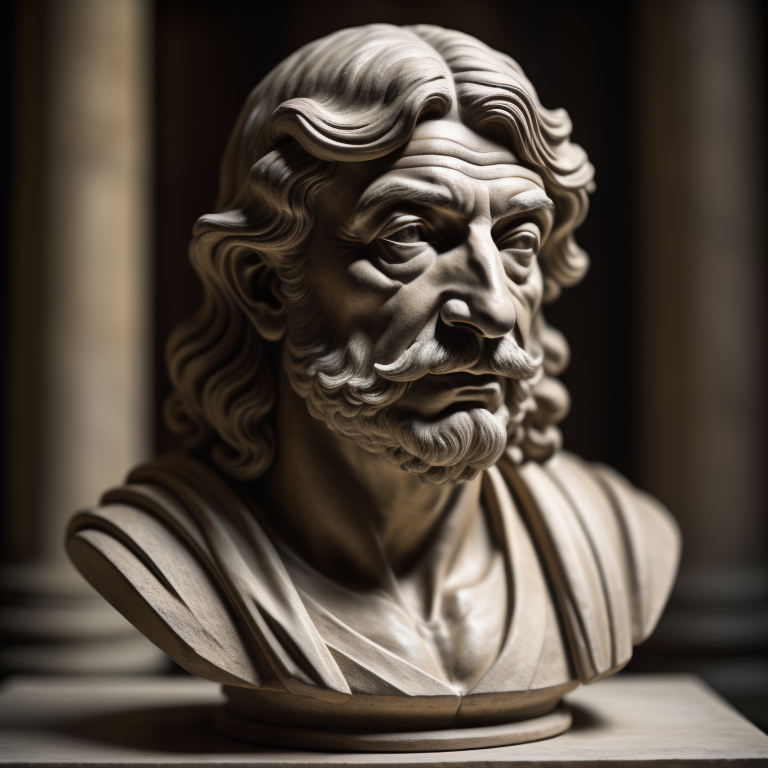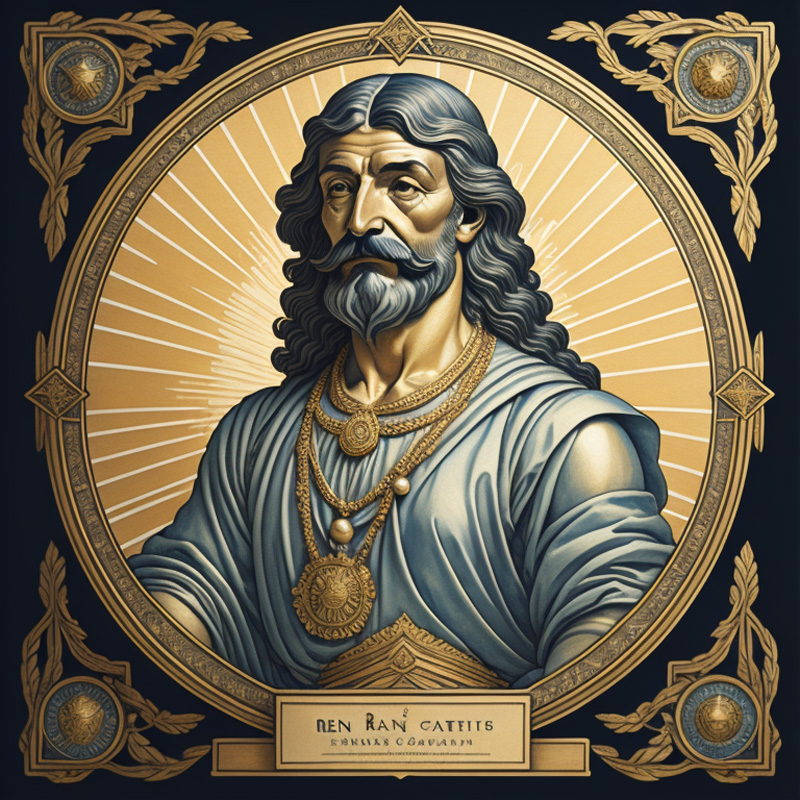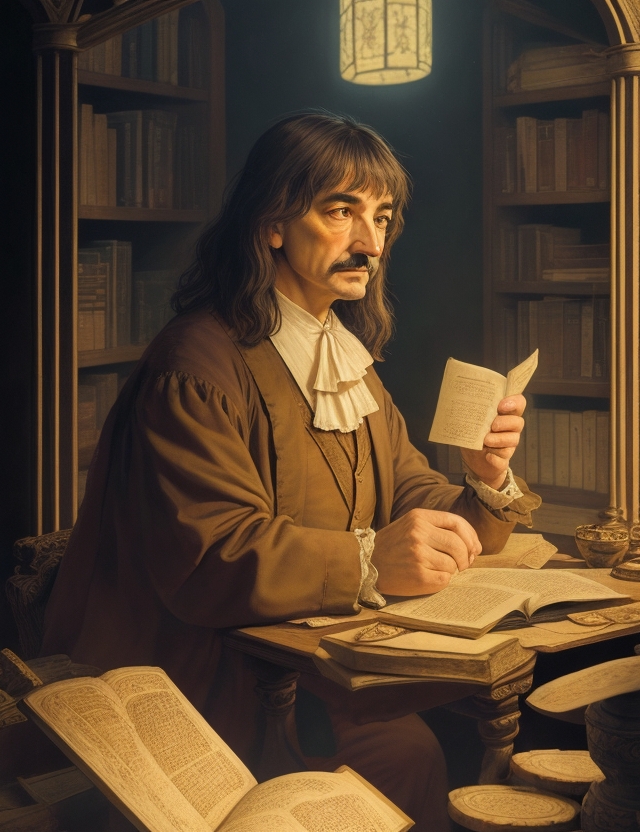
Rene Descartes
Rene Descartes: Exploring his Philosophy
René Descartes (1596-1650)
René Descartes (1596-1650) was an influential French philosopher, mathematician, and scientist. He is known for his famous statement “Cogito, ergo sum” (I think, therefore I am), which highlights his focus on the method of doubt and the role of individual thought in the search for truth. His works, such as “Discourse on Method” and “Meditations on First Philosophy”, revolutionized modern philosophy by introducing rational thought and methodical doubt as fundamental bases of knowledge.
The main philosophical ideas
Descartes was a French philosopher, mathematician, and scientist who is considered one of the founders of modern philosophy. His main idea was that the only way to achieve true knowledge was through methodical doubt. This means that we must doubt everything we know, even the things that seem most obvious, until we find something that cannot be doubted.
His philosophy in a sentence
“I think, therefore I am.”
Explanation of this philosophy to a child between 7 and 10 years old
Imagine that you are playing in the park and you find a coin. How do you know the coin is real? How do you know it’s not a magic trick? Descartes would say that you can’t know anything for sure, because everything you see and touch could be an illusion. The only way to know something is real is to think about it. If you can think of something, then it must exist, because thought is proof of existence.
Explanation of this philosophy to an adult
Descartes’ methodical doubt is a method of reasoning that is based on the idea that you cannot believe in anything that cannot be proven. Descartes believed that everything we know can be false, so we must start by doubting everything. As we doubt everything, we will eventually come to something that cannot be doubted: our own thinking. The fact that we can think means that we exist, because thinking is a mental activity.
Descartes’ philosophy has had a great influence on Western thought. His method of doubt has been used by philosophers and scientists for centuries. He has also been a source of inspiration for many artists and writers.
The positive side of this philosophy
The positive side of Descartes’ philosophy is that it invites us to question everything we know and think for ourselves. He teaches us that we should not accept things blindly, but rather that we should seek evidence for everything we affirm. This can help us be more critical and think more independently.
The negative side of this philosophy
The downside to Descartes’ philosophy is that it can be very discouraging. If we doubt everything we know, it can be difficult to find something to believe in. It can also be difficult to find the motivation to act, if we are not sure that our actions have any effect.
A real-life problem
A real-life problem that is best suited to the use of Descartes’ philosophy is uncertainty. We often find ourselves in situations where we don’t know what to do or what to believe. In these cases, Descartes’ philosophy can help us take a step back and think more rationally. We can ask ourselves: What do I know for sure? What are the possible solutions to this problem? What is the most likely solution?
Using Descartes’ philosophy, we can arrive at a solution that is most likely to be correct. We can also learn to live with uncertainty, knowing that we may not always have all the answers.
Descartes’ philosophy is a method of thinking that can be very useful for solving problems and making decisions. However, it is important to take into account its limitations. We must not fall into skepticism and doubt everything we know. We must find a balance between doubt and trust, so that we can live our lives fully and meaningfully.
The opposite philosophy to that of René Descartes: empiricism.
Empiricism is a philosophical current that maintains that all knowledge is derived from sensory experience. This means that we cannot know anything that we have not experienced directly through our senses. Unlike Descartes’ rationalism, which maintains that reason is the source of all knowledge, empiricism affirms that experience is the source of all knowledge.
The positive aspects of empiricism
Empiricism has several positive aspects. First of all, it is a realistic approach to knowledge. Empiricism holds that knowledge is based on reality, not ideas or assumptions. Second, empiricism is a pragmatic approach to knowledge. Empiricism holds that knowledge is useful, and that it should be judged by its usefulness. Third, empiricism is a democratic approach to knowledge. Empiricism holds that everyone has the potential to acquire knowledge, not just the intellectual or the privileged.
The negative aspects of empiricism
Empiricism also has some negative aspects. First, empiricism can be relativistic. Relativism is the idea that there is no absolute truth, only truths relative to each individual or culture. Second, empiricism can be skeptical. Skepticism is the idea that nothing can be known with certainty. Third, empiricism can be inconclusive. Empiricism may not be able to provide definitive answers to some questions, such as the origin of the universe or the nature of reality.
A comparison between rationalism and empiricism
Rationalism and empiricism are two of the main philosophical currents. Rationalism holds that reason is the source of all knowledge, while empiricism holds that experience is the source of all knowledge.
Rationalism is a more abstract approach to knowledge, while empiricism is a more concrete approach to knowledge. Rationalism is better suited for abstract questions, such as the nature of reality, while empiricism is better suited for concrete questions, such as the workings of the natural world.
Rationalism is more susceptible to skepticism, since it can be difficult to find definitive proof for rational ideas. Empiricism is more susceptible to relativism, since empirical knowledge can vary from one culture to another.

Sources
Books:
- “Discurso del Método”
“Meditaciones sobre la Filosofía Primera”
“Principios de la Filosofía”
Websites:
- Stanford Encyclopedia of Philosophy (Enciclopedia Stanford de Filosofía)
Internet Encyclopedia of Philosophy (Enciclopedia de Filosofía en Internet)
Proyecto Filosofía en Español






0 comments